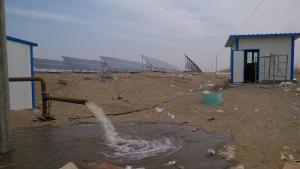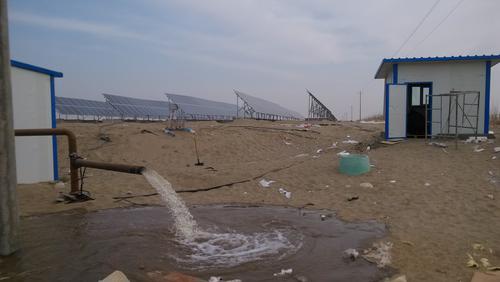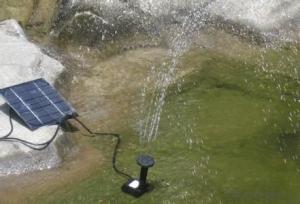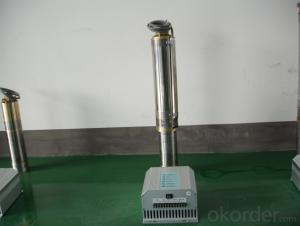Poseidon Solar Pump Inverter - Kusum Solar Pump Yojana Compatible
- Loading Port:
- China Main Port
- Payment Terms:
- TT OR LC
- Min Order Qty:
- -
- Supply Capability:
- -
OKorder Service Pledge
OKorder Financial Service
You Might Also Like
Hefei poseidon solar pv pump co., ltd is a leading supplier of inverter for the Solar PV pump market. Lead by veterans from the solar and semiconductor, our combines advanced and patented PV inverter technology, proprietary Power Line Communications (PLC) technologies, and well managed manufacturing capabilities to offer its customers with PV inverter systems that are more productive, more reliable, and more intelligent – increasing the energy harvest of solar panels . We participate in formulate a series of national standards,like< Photovoltaic pumping system>(NB/T32017-2013) and <General specifacitions for PV trickle irrigation system>
Based on its several years’ R&D, technical and market experience, under the domestic and foreign advanced management concepts, we have launched series of solar pv pump inverters.
By its complete system, the superior performance-to-price ratio and the formidable universality, our product widely applies in the fields of agriculture.
- Q: What is the expected maintenance cost for a solar pump?
- The expected maintenance cost for a solar pump can vary depending on factors such as the quality of the pump, the environment in which it is installed, and how well it is maintained. However, in general, the maintenance cost for a solar pump is relatively low compared to traditional pumps. This is because solar pumps have fewer moving parts and are designed to be more durable and resistant to wear and tear. Regular maintenance tasks may include cleaning the solar panels, checking connections, and inspecting the pump for any signs of damage or malfunction. Overall, the expected maintenance cost for a solar pump is typically minimal, making it a cost-effective and sustainable choice for water pumping.
- Q: How does a solar pump handle fluctuations in water demand?
- A solar pump handles fluctuations in water demand by adjusting its output based on the availability of sunlight. When there is high demand, the pump operates at its maximum capacity, utilizing the energy from sunlight efficiently. During periods of low demand, the pump slows down or even shuts off, conserving energy and ensuring optimal use of available resources.
- Q: Can a solar pump be used for fountain or waterfall features?
- Indeed, fountain or waterfall features can make use of a solar pump. These pumps are specifically devised to run on solar energy, eliminating the need for electricity from the grid. This renders them a perfect option for outdoor water features like fountains or waterfalls, where accessing electricity can prove arduous or costly. Solar pumps typically boast effortless installation and operation, ensuring a steady water flow that gives rise to stunning and calming water exhibitions. Furthermore, opting for a solar pump for a fountain or waterfall exemplifies environmental consciousness as it harnesses renewable energy and diminishes dependence on conventional electricity sources.
- Q: Do solar pumps require any additional equipment?
- Yes, solar pumps typically require additional equipment such as solar panels, controllers, batteries, and in some cases, a storage tank or filter system.
- Q: Are there any limitations on the water pH or alkalinity that a solar pump can handle?
- Yes, there are limitations on the water pH and alkalinity that a solar pump can handle. Most solar pumps are designed to handle water with a pH range of 6.5 to 8.5 and alkalinity levels below 500 parts per million (ppm). Water outside of these ranges can potentially damage the pump's components or reduce its efficiency. It is important to consider water quality parameters and consult the manufacturer's specifications before installing a solar pump.
- Q: What is the expected lifespan of the solar panels in a solar pump system?
- The expected lifespan of solar panels in a solar pump system can vary depending on several factors. On average, most solar panels have a lifespan of about 25 to 30 years. However, with proper maintenance and care, they can last even longer. The durability of solar panels is influenced by various factors, such as the quality of the materials used, the manufacturing process, and the environmental conditions in which they are installed. High-quality panels made from durable materials tend to have a longer lifespan. Regular maintenance and cleaning of the solar panels are essential to maximize their lifespan. Dust, dirt, and debris can accumulate on the surface, reducing their efficiency over time. Cleaning them periodically and ensuring they are free from any shading or obstructions can help maintain their performance and extend their lifespan. Additionally, extreme weather conditions such as hail, heavy snow, or strong winds can potentially damage solar panels. However, modern solar panels are designed to withstand these conditions to a certain extent. So, it is crucial to choose panels with good weather resistance, especially if you live in an area prone to severe weather events. In conclusion, the expected lifespan of solar panels in a solar pump system is typically around 25 to 30 years, but it can be extended with proper maintenance and care. Choosing high-quality panels and ensuring they are regularly cleaned and protected from extreme weather conditions can help maximize their lifespan.
- Q: How does a solar pump help in maintaining water quality?
- A solar pump helps in maintaining water quality by providing a reliable and sustainable source of energy to operate water treatment systems. It allows for efficient water circulation, aeration, and filtration, which are essential for preventing the growth of harmful bacteria, algae, and other contaminants. Additionally, solar pumps reduce dependence on fossil fuels and minimize pollution, ensuring cleaner and healthier water sources.
- Q: Can a solar pump be used in off-grid locations?
- Yes, a solar pump can be used in off-grid locations. Since solar pumps are powered by solar energy, they do not require access to the electrical grid, making them suitable for use in remote or off-grid areas where electricity supply is limited or non-existent.
- Q: Can a solar pump be used for water supply in botanical gardens or nurseries?
- Yes, a solar pump can be used for water supply in botanical gardens or nurseries. Solar pumps are an environmentally friendly and cost-effective solution for providing water in such settings. They can harness solar energy to power the pump, eliminating the need for electricity or fuel. This makes them ideal for remote locations or areas with limited access to electricity. Solar pumps can efficiently distribute water to plants, ensuring their hydration and growth while reducing reliance on traditional energy sources.
- Q: Are there any restrictions on using a solar pump in residential areas?
- There may be some restrictions on using a solar pump in residential areas depending on the local regulations and zoning laws. It is advisable to consult with the local authorities or homeowner's association to understand any specific guidelines or restrictions that may apply in your area. Some common restrictions may include noise limitations, height restrictions, setback requirements, and limitations on the installation of solar panels. Additionally, some areas may require obtaining permits or licenses before installing a solar pump. It is essential to ensure compliance with any applicable regulations to avoid any potential legal issues or penalties.
Send your message to us
Poseidon Solar Pump Inverter - Kusum Solar Pump Yojana Compatible
- Loading Port:
- China Main Port
- Payment Terms:
- TT OR LC
- Min Order Qty:
- -
- Supply Capability:
- -
OKorder Service Pledge
OKorder Financial Service
Similar products
Hot products
Hot Searches
Related keywords
























